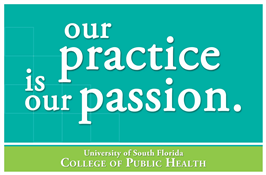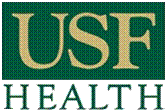Online Hours
Hours displayed in:Eastern Time (US & Canada)
About
 |
At the University of South Florida College of Public Health, we’re passionate about transforming health. From the global environment right down to the cellular level, we believe the treatment of disease can be transformed by viewing it in the full spectrum of health. We believe that communities can be transformed into healthy and sustainable settings. And, we believe public health provides the leadership of the future through learning, research, service, and advocacy.
Feel the passion. Make a difference. Change the world.
Established in July 1984 with an initial enrollment of 100 students, the College is fully accredited by the Council on Education for Public Health (CEPH) and has graduated over 2,000 students. Current enrollment includes over 1,100 full and part-time graduate and undergraduate students. Constructed in 1991, the College building houses an auditorium, classrooms, a distance education studio, computer classrooms, and 17 laboratories. More than 91 faculty provide education, research and service impacting local, state, national and global public health.
The field of public health is broad and draws its strength, as well as its students, from diverse academic disciplines including, but not limited to: health care, natural sciences, business, education, engineering, law and social services. The curriculum features cooperative learning, research, problem-solving, and field experience so that faculty and students together contribute to pursuits essential to the health of human society. Alternate delivery of degrees and certificates by web, executive format, weekend, and alter nate calendar options greatly expand student opportunity.
Vision
Our College of Public Health community will use its unique strengths and collective efforts to achieve prominence in advancing public health.
Mission
Our mission is to improve the public’s health through advancing discovery, learning, and service.
College Resources
The College has two primary computer labs designed to serve as both classroom and individual work stations. The first is a teaching classroom (Lab B) with 46 stations plus 1 instructor’s station. It is used for organized classes as well as special seminars and has proven to be a valuable resource for those interested in developing questionnaires, data collection, data entry, and statistical analysis. The second laboratory (Lab A) has 37 computers and is an open-use lab for COPH students.
Within the primary College of Public Health building there are 17 Research Labs that support research in environmental health, industrial hygiene, physiology, water and air quality, immunology, toxicology, parasitology, risk management, ergonomics, heat stress, occupational safety, electron microscopy infectious diseases and microbiology. The William “Doc” Myers Tampa Branch Laboratory, home to the Florida Department of Health and the College of Public Health’s Center for Biological Defense, is physically located on the USF campus and offers a unique public-public partnership between the academic and applied aspects of disease surveillance, detection, and prevention. Finally, the College has moved into the new Interdisciplinary Research Building (IDRB), located in the USF Research Park. In the IDRB, the College has faculty and student researchers working in three modern BSL-2 laboratories as well as three BSL-3 laboratories to support work in emerging infectious disease, and has begun plans to build out an additional 4,000 square feet of laboratory space in the building.
Since 1994 the College of Public Health’s Office of Educational Technology and Assessment (ETA) has been a means to provide access to graduate public health education via online learning. The College offers web based courses, in addition to the Online MPH In Public Health Practice and other online certificate programs. A state of the art distance learning studio complete with satellite and videoconferencing capabilities is used for outreach efforts and continuing education offerings for faculty, staff and students. A multimedia studio facility equipped with cutting-edge technologies allows faculty to record and digitize audio and video content for online class delivery. For more information on ETA, go to health.usf.edu/publichealth/eta.
Continuing Education offers public health conferences, workshops and training on a variety of subjects and offers administrative support for governmental and non-governmental public health agencies that provide conferences. For more information, go to: www.cme.hsc.usf.edu.
Student Associations provide a united voice in curriculum development, policy-making and other important decisions. Social functions, community service events, and scholarly programs are promoted. Student associations include: the Public Health Student Association (PHSA), Infectious Disease Association (IDA), American College of Healthcare Executives (ACHE), the Global Health Student Association (GHSA), and the International Health Service Collaborative (IHSC).
Goals
The following are the 2007-2012 Strategic Plan Goals together with the Goal statements:
- Goal 1: Discovery
The USF COPH will create and disseminate knowledge to improve the public’s health. - Goal 2: Learning
The USF COPH will advance a leaning community that nurtures discovery, leadership and practice. - Goal 3: Service
The USF COPH will engage in service and partnerships with the University, the profession, and the world community. - Goal 4: Environment
The USF COPH will enhance its overall capacity by providing an environment that facilitates faculty, staff and student success. - Goal 5: Diversity
The USF COPH will engage diverse faculty, staff, and students to work toward health equity and justice for all populations in the world community.
College of Public Health Value Statement 2010
As an overarching statement of commitment, the faculty, staff, and students at the USF COPH affirm the Universal Declaration of Human Rights that “humans have a right to the resources necessary for health” and that “everyone has the right to a standard of living adequate for the health and well-being.”
In the spirit of justice and equality, the COPH values reflect our commitment to public health and to the preparation of public health professionals as advocates for the interests of local, national and global communities. These values should serve as a guide to decisions and behaviors, and should form the moral compass that guides and sets the standard for excellence and effectiveness in everything the college and its members undertake.
The COPH core values are:
- community engagement,
- global perspective,
- diversity,
- leadership, and
- the professional environment.
Community Engagement: The COPH strives to make a difference through its dedication to service. Improving the public’s health is its passion and mission. The COPH embraces the collaborative efforts of faculty, students, staff and its constituent communities to enhance relationships and to improve health for all. Service to its communities defines the role of the public health professional by building trust and respect.
Global Perspective: Public health professionals have a duty to seek knowledge and service from a global perspective, yet COPH efforts to protect and promote health must be locally-focused. Communities and their environment are interdependent; adversity in one area affects many others. The social determinants of health must be equalized for all to have access to the resources necessary for health.
Diversity: The diverse nature of the COPH as well as the people it serves contributes to a rich tapestry of knowledge, skills and practices in both global and local communities. By creating a respectful working environment, the COPH produces public health professionals with the necessary background and values for positive health outcomes.
Leadership: Leadership at the COPH prepares public health professionals to empower communities to create healthy living conditions and health for themselves and their families. The COPH supports and encourages leadership-by-example, thus, fostering integrity and responsibility among all people involved in public health.
The Professional Environment: The COPH is heralded for its commitment to academic excellence through its focus on innovative research and effective teaching and learning. Faculty, students and staff go above and beyond expectations to achieve distinction and merit. Professionalism permeates the COPH environment and culture.
Accreditation
The University of South Florida is accredited by the Commission on Colleges of the Southern Association of Colleges and Schools (1866 Southern Lane, Decatur, Georgia 30033-4097; Telephone number 404-679-4501) to award degrees at the baccalaureate, master, specialist and doctoral levels, including the Doctor of Medicine.
The College of Public Health is fully accredited by the Council on Education in Public Health (CEPH). CEPH (800 Eye Street, NW, Suite 202, Washington, D.C. 20001-3710) is an independent agency that is recognized by the US Department of Education to accredit schools of public health. The College received notice dated October 20, 2011 that it has been reaccredited for seven years, through December 31, 2018; this is the maximum possible number of years attainable in a reaccreditation cycle.
The MSPH in Industrial Hygiene is accredited by the Accreditation Commission of the Accreditation Board for Engineering and Technology. 111 Market Place, Suite 1050, Baltimore, MD 21202-4012. Telephone 410-347-7700.
Research
Through research and study, faculty and their students seek solutions to complex health problems that result in positive impact on the health of the community (local, state, national, and global).
Support for research comes from public agencies including the National Institutes of Health, Health Resources Services Administration, the Centers for Disease Control and Prevention, from private agencies, foundations and business, and from governmental partners such as the Florida Department of Health. Local affiliations include county public health departments, hospitals, HMOs and community based clinics.
For more information on the multi-faceted research aspects of the College, go to:
- Office of Research: health.usf.edu/publichealth/officeresearch/
- Centers and Institutes: health.usf.edu/publichealth/researchcenters.html
- Interdisciplinary Training Program for Infectious Disease Drug Discovery (PDF file)
Faculty Research Interests Links
Faculty research interests can be found at health.usf.edu/publichealth/facultyaffairs/facultyprofile.html




